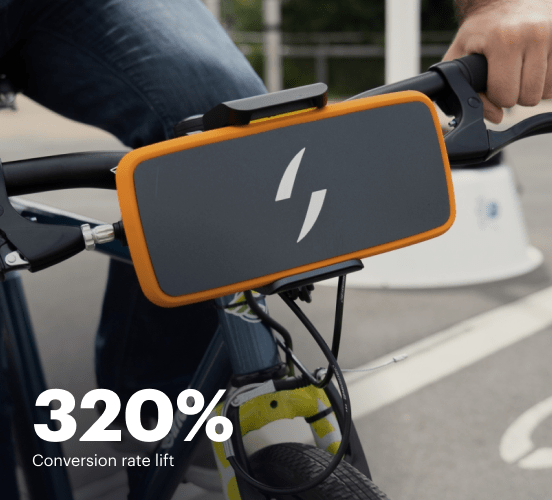Paperform vs. Formsite: the best platform for a seamless web experience
Discover how Paperform compares to Formsite regarding features and usability. Find out which platform provides the competitive advantage your business deserves.
Get startedSee how Instapage stacks up against the competition
| Feature | Instapage | Other builders |
| Drag-and-Drop Tools | ||
| Conversion-optimized templates | ||
| Manual and AI-powered A/B Tests | ||
| AI content suggestions | ||
| Popups and sticky bars | ||
| Canvas and grid blocks | ||
| Reusable and global elements | ||
| Form and popup builders | ||
| Built-in Heatmaps | ||
| Central analytics dashboard | ||
| Ad-to-page personalization and collections | ||
| Contacts, lists, and email | ||
| Dedicated, full-service CRO experts | ||
| Enterprise-ready platform |
Leading the way in building high-performing landing pages





Why Instapage is the smarter choice for your campaigns
Get everything you need to build, scale, and optimize high-converting landing pages—without coding.
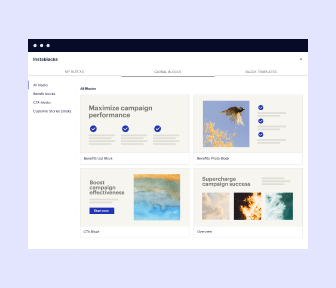
Easier page building without coding
Instapage offers a flexible and seamless page creation experience with a library of 500+ conversion-focused layouts, Instablocks®, a drag-and-drop builder, and AI content generation. With technologies like Thor Render Engine®, you can create on-brand, mobile-responsive landing pages that load quickly and start converting during initial visitor clicks.
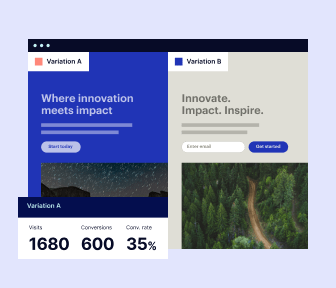
More insights — better results
Instapage lets you see in detail how each landing page experience and variation is performing so you can make targeted changes that boost page conversions. Use heatmaps for a better understanding of on-page activities, run A/B tests and AI-assisted experiments, and then track and evaluate results within robust analytics dashboards.
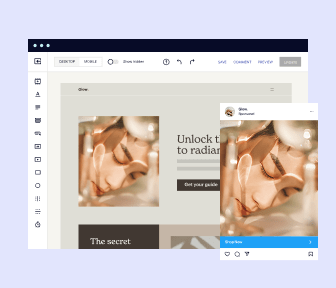
More personalized experiences
Instapage lets you quickly create high-performing landing pages tailored to each of your ad campaigns. Deliver personalized experiences for distinct audiences using dynamic text replacement. Effortlessly align specific advertisements to unique pages with AdMaps. Monitor audience-level metrics using our advanced data tools.
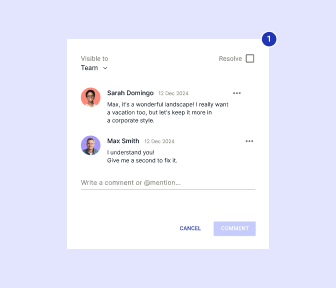
Built-in collaboration
Instapage collaboration capabilities bring your entire team together to speed up the process of landing page review, approval, and launch. No more frustrating and unnecessary revisions or edits scattered across emails. Provide instant feedback, conduct real-time page edits, and securely share your pages with outside stakeholders.
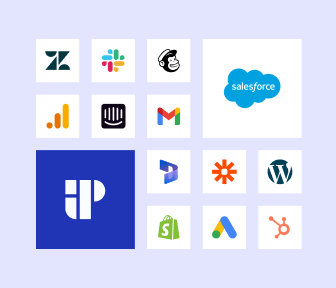
Free up time for your business
Invest time into business growth, not busy work. Launch landing pages faster with reusable forms and templates. Build once, reuse forever.
Explore all integrations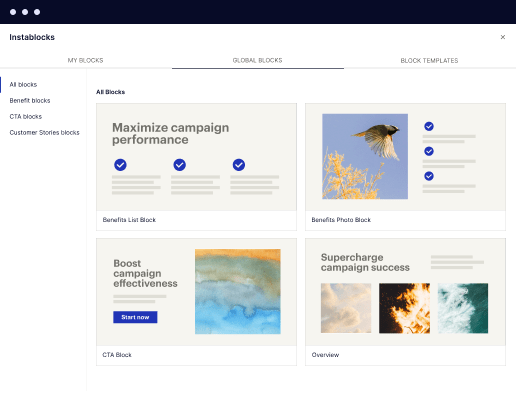
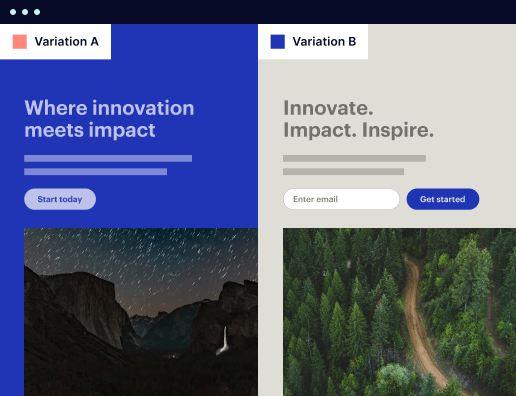
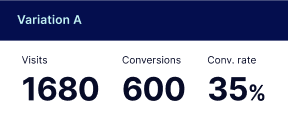
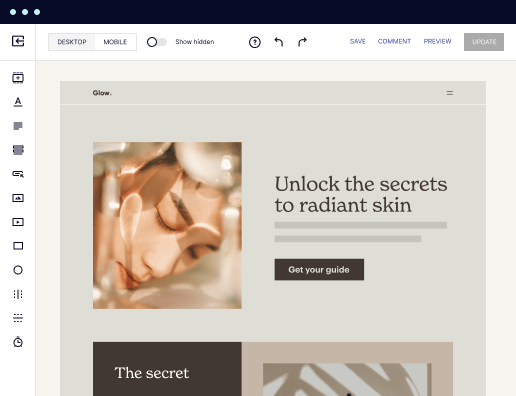

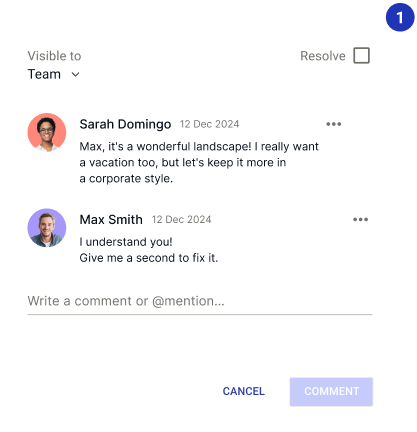
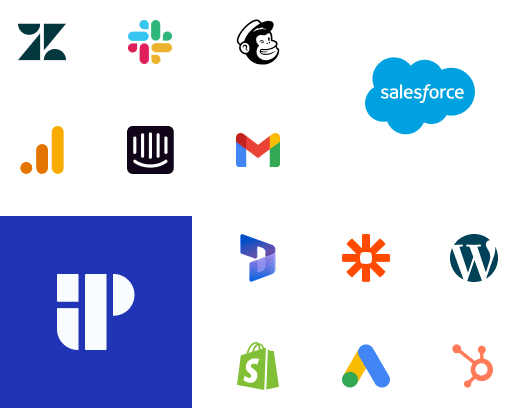
Easier page building without coding
Instapage offers a flexible and seamless page creation experience with a library of 500+ conversion-focused layouts, Instablocks®, a drag-and-drop builder, and AI content generation. With technologies like Thor Render Engine®, you can create on-brand, mobile-responsive landing pages that load quickly and start converting during initial visitor clicks.
More insights — better results
Instapage lets you see in detail how each landing page experience and variation is performing so you can make targeted changes that boost page conversions. Use heatmaps for a better understanding of on-page activities, run A/B tests and AI-assisted experiments, and then track and evaluate results within robust analytics dashboards.
More personalized experiences
Instapage lets you quickly create high-performing landing pages tailored to each of your ad campaigns. Deliver personalized experiences for distinct audiences using dynamic text replacement. Effortlessly align specific advertisements to unique pages with AdMaps. Monitor audience-level metrics using our advanced data tools.
Built-in collaboration
Instapage collaboration capabilities bring your entire team together to speed up the process of landing page review, approval, and launch. No more frustrating and unnecessary revisions or edits scattered across emails. Provide instant feedback, conduct real-time page edits, and securely share your pages with outside stakeholders.
Free up time for your business
Invest time into business growth, not busy work. Launch landing pages faster with reusable forms and templates. Build once, reuse forever.
Explore all integrationsGet started with Instapage in a few steps
-
Create your Instapage account
Start with Instapage by signing up via Google or your email. You'll get access to a free 14-day trial to discover Instapage capabilities. Feel free to cancel anytime during the 14-day trial if you decide that our product is not suitable for your business. -
Build and personalize your page
Create your first landing page from scratch or choose a template from 500+ customizable layouts. Use the drag-and-drop builder to add page elements, fonts, and backgrounds, refine content with AI, or add custom HTML, Javascript, and CSS. -
Review and make edits
Collaborate on page designs and streamline review processes. Invite your team members and stakeholders to review, edit, and provide feedback on your landing page. Collaborate knowing your page is confidential and only accessible to authorized users. -
Publish and track page performance
Publish your page to a domain or custom URL. Connect your pages to the ads you've created and track page performance within the analytics dashboard, run A/B tests and AI experiments, analyze results, and continuously optimize your landing page to maintain high conversions.
Paperform vs. Formsite: Battle of the Form Builders with a Special Guest
In the bustling digital marketplace, creating effective forms can feel like navigating a maze. With countless options available, choosing the right form builder is no small feat. Two heavy hitters in this arena are Paperform and Formsite. Each comes packed with features and user-friendly options designed to make form creation a breeze. But here’s the interesting twist—Instapage is lurking in the background, redefining what businesses expect from form-building tools. This article will take you through the significant aspects of each platform, equipped with insights to guide your decision-making process and help you harness the power of forms for lead generation, customer feedback, and more.
Introducing Our Contestants
In one corner, we have Paperform—a platform that proudly declares itself as the Swiss Army knife of form builders. Known for its flexibility and creativity, Paperform allows users to craft visually appealing, highly customizable forms. Its signature move lies in its ability to blend forms with digital documentation, ensuring a seamless user experience. In the opposing corner is Formsite, a powerhouse of functionality, known for its robust security features and enterprise-level tools. Formsite shines with its impressive feature set, catering to users who need serious data management without the hassle. As we delve deeper into each platform's specifics, remember that our stealthy contender, Instapage, is primed to disrupt the competition.
Feature Face-off: Who Packs More Heat?
When it comes to features, both Paperform and Formsite bring their best to the competition. Paperform dazzles users with its extensive template library and integration capabilities, which allow for effortless connection with email marketing and CRM tools. It offers drag-and-drop functionality, making it simple for anyone—even those who might feel intimidated by technology—to create stunning forms. On the other hand, Formsite flaunts its advanced logic features, allowing users to create complex forms that cater to specific user pathways. Additionally, Formsite’s strong focus on compliance and security makes it the choice for businesses handling sensitive data. But just when you think it’s a one-on-one contest, keep an eye on Instapage, the secret weapon lurking in the corner, ready to take form creation to the next level.
Usability: The User Experience Showdown
User experience can often be the make-or-break factor in choosing a platform. When comparing usability, Paperform feels like a stroll in the park for newcomers. The straightforward interface and intuitive design mean even the most novice users can create sophisticated forms in no time. With a friendly learning curve, users can dive in without feeling lost. Conversely, Formsite, while feature-rich, may present a more complex landscape for those just starting. However, those who invest a little time in familiarization will find powerful tools at their fingertips. Navigating through features may feel more like an adventure, slightly more challenging but rewarding for those seasoned in form building.
What Makes Paperform Stand Out:
- Visually stunning templates that enhance brand identity.
- Drag-and-drop functionality for effortless form design.
- Easy integration with various applications for seamless data transfer.
- Conditional logic capabilities to personalize the user experience.
- Flexible payment options integrated within forms.
Key Features of Formsite:
- Robust data collection that ensures security and compliance.
- Customization options tailored for enterprise-level solutions.
- Advanced branching logic to guide users through forms.
- Pre-built templates for quick form setup.
Common Strengths of Both Platforms:
- Mobile-friendly design for forms that look great on any device.
- Integration capabilities with popular marketing tools.
- Real-time reporting features that offer insights into form performance.
- User-friendly interfaces promoting ease of use.
- GDPR compliance to protect user data.
- Customer support available to assist users at all skill levels.
In the boxing ring of form builders, it’s clear that both Paperform and Formsite have their strengths. However, Instapage stands out as a formidable competitor that may outshine the two in several areas—seamlessly combining form functionality with landing page effectiveness, giving marketers an edge that the others might lack.
Performance Wars: Speed and Responsiveness
Performance is critical in retaining user attention. Both Paperform and Formsite deliver well on this front, offering responsive designs that adapt effortlessly to mobile devices. However, page loading time is a crucial differentiator. Paperform's lightweight forms tend to load quickly, reminiscent of a slick sports car zipping down the highway. In contrast, slow-loading pages can feel like molasses in winter—a frustration nobody wants to experience, especially when waiting for a form to submit. A slight delay can turn potential customers away in an instant. Both platforms are committed to providing fast, reliable service, but actual speed testing may reveal variances that could influence your choice.
Support Systems: Who Has Your Back?
Support channels are vital in ensuring users can harness the full potential of the chosen platform. Paperform offers a robust knowledge base coupled with email support, while Formsite provides extensive resources and community support. Imagine the support teams as the trusty sidekicks on this form-building journey—always ready with helpful tips and quick fixes. By evaluating the available support features, you not only understand who can help you when trouble strikes but also realize the value of a platform that backs its users.
Pricing Dynamics: Which is More Pocket-Friendly?
Advantages of Paperform’s Pricing Strategy:
- Flexible pricing tiers catering to various needs.
- Affordable entry-level plans for small businesses.
- Transparent pricing structure without hidden fees.
- Generous trial periods to test features before committing.
Benefits of Formsite’s Pricing Strategy:
- Cost-effective plans for enterprises with high-volume needs.
- Free trial option to explore features.
- Pay-per-form models suitable for occasional users.
- Discounts offered for annual subscriptions.
When considering pricing strategies, both Paperform and Formsite have their merits, catering to different budgets and needs. However, Instapage presents a flexible and arguably more comprehensive pricing strategy, making it an appealing option for those looking to maximize value for their investment. Therefore, while both options have their advantages, there is a clear level of flexibility with Instapage's pricing.
A detailed look into the pricing plans highlights the need to choose wisely, revealing the age-old adage—getting what you pay for—and sometimes stumbling upon unexpected benefits in unassuming packages. Having options allows users to find a solution that fits their specific needs, from a simple form to complex data management.
And Then There's Instapage...
Instapage stands apart as a beacon of possibility, offering businesses a chance to combine form and landing page functionality seamlessly. With unique capabilities like A/B testing designed to optimize conversions, this platform truly has something special to offer. It takes form building a step further by integrating landing page creation with exceptional customization, ultimately leading to better engagement and conversion rates. Instapage focuses on fostering a holistic approach, ensuring marketers are equipped with the right tools to excel without compromising user experience. Overall, it positions itself as the secret weapon businesses may not know they need.
In closing, the journey through the digital landscape of form builders can be daunting, yet empowering. With all the information in hand, it's essential for businesses to align their choices with their goals. Paperform and Formsite each have distinct strengths, but Instapage shines with its unique offerings. By choosing wisely, businesses can set the stage for success, making informed decisions that propel them forward in their marketing journey.

